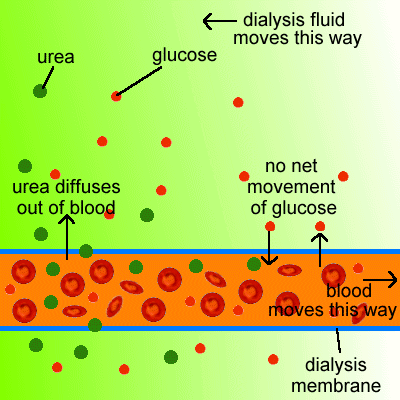Dialysis
A patient with kidney failure will soon die unless there is a way to rid the body of the urea and excess salt. A kidney dialysis machine provides an artificial kidney for the sufferers of kidney failure.
Blood is drawn from a vein in the body and enters the dialysis machine. The blood flows through a dialysis membrane, which is semi-permeable. It has in it pores which will allow small particles to pass through, like water, urea, salt, glucose and amino acids but not large particles like protein or cells.

Surrounding the membrane is dialysis fluid. This contains chemicals, which should be in the blood plasma (glucose, amino acids & salts), in the correct concentrations.
The urea moves from the blood to the dialysis fluid by diffusion. Other small particles diffuse from the blood to the dialysis fluid too. As glucose diffuses out of the blood, glucose also diffuses into the blood from the dialysis fluid. This keeps the concentration of important chemicals in the blood constant.
Excess salt diffuses out of the blood, keeping it at the right levels. Osmoregulation occurs in much the same way. If there is too much water in the blood it will enter the dialysis fluid by osmosis. The reverse occurs if the blood is too concentrated.
The blood is kept at the correct temperature while it passes through the machine. The blood then returns to the body.
The patient needs to be on the machine for around 12 hours and the treatment needs to be repeated three times a week. The patient needs to be careful what they eat & drink. Too much salt & protein between dialysis treatments can cause problems. Also the amount of fluid which may be taken is very restricted, as the body has no way of getting rid of it. Obviously the kidney dialysis machine is not as good as a real kidney. A kidney can be transplanted to take over the role of the damaged kidneys. This is preferable but kidneys are hard to come by, as someone has to die to supply them.
Kidney machines are more readily available than transplants but they are restrictive in that you are tied down to them and diet must be controlled. Kidney transplants enable you to lead a normal life, but the kidney needs to be a correct tissue match (to avoid rejection) and there needs to be a donor.
